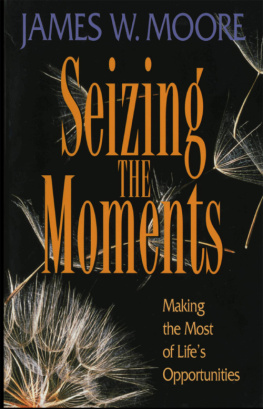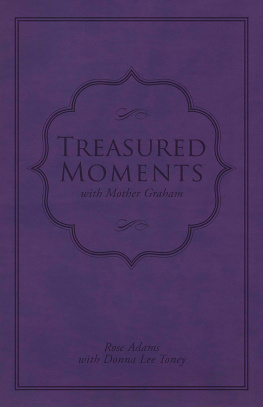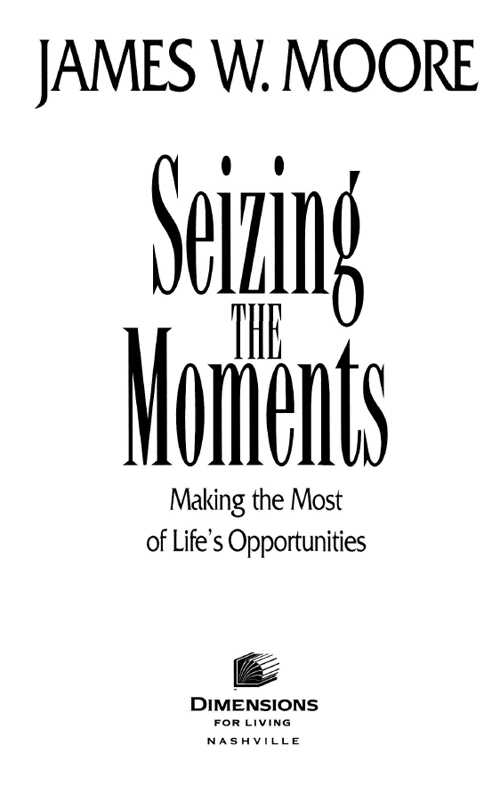Introduction
The Tragedy
of the Unseized Moment
In the hit Broadway musical Stop the World, I Want to Get Off! actor Anthony Newley played a kind of "everyman" character, and he sang that powerful song "Once in a Lifetime." It contains these poignant words:
This is my moment... I'm gonna do great things.
"This is my moment." We all have known that feeling, haven't we?that special occasion when something stirs within us and we know that a unique opportunity is now available to us, maybe never to return again in just that way.We know the feeling of the crucial moment.
Sadly, however, we must confess that we also know the empty feeling of "missing our moment," letting the moment pass. The truth is that life is a series of crucial moments, destiny moments, moments of decision. All of us have had the experience of sensing that this time, this occasion, is a special moment and we should say or do or be something. But because of fear, or timidity, or insecurity, we let the moment slip by. We do nothing, we miss our moment, and then we regret it greatly because we know deep down that we cannot reclaim itthat special moment is gone forever.
There is an interesting point here. Psychologists tell us that if we do not act every time we have this kind of feeling, we are less likely to act later when other such moments present themselves. Each time we fail to act, we become more closed, more hardened, more desensitized, more emotionally paralyzed.
A colorful illustration is found in Indian folklore. The Pima Indians believed that a stone with spokes sticking out of it was positioned next to the heart. If a person hurt or neglected someone, or did something to break down a relationship, the stone would begin to turn, and it continued to turn until the situation was set right or corrected. According to this fascinating legend, although the spikes rubbed against the heart, they did not cut or puncture it; they merely rubbed and rubbed until the heart became more and more calloused. In other words, the longer one waits to correct a situation, the more calloused one becomes.
A dramatic example is the mentally ill person who crouches on the floor in a fetal position, not speaking or paying attention to anyone or anythingclosed in, withdrawn, turned off, and tuned out. What we often do is just as paralyzing. We trick ourselves by substituting emotion for action. We may feel something like sympathy or appreciation or a moral commitment, but then we say, "Well, that takes care of that!" and we do nothing. We trick ourselves into thinking that just because we felt the emotion, the situation has been taken care of.
Some years ago a member of our congregation was highlighted in the local newspaper for his great community work.I was so happy to see that St. Luke's member out in the community doing significant things, out there being the church in the world. I felt a warm glow, and I thought to myself, I'm going to clip this article out of the newspaper and write a letter of congratulations and appreciation to let this special friend know that all of us here at St. Luke's are proud of his dedicated efforts. Now, I felt that, and I meant to do it, but I didn't do a thing! I never got around to it! I felt it, but I did not act on it.
You see, that's what we do. We substitute the feeling for the action. We trick ourselves into thinking that just because we felt it, it has been cared for, and that is tragic! Unless we act on the feeling, unless we act at the crucial moment, it will soon pass, and nothing will have been done.
- How many letters never have been written?
- How many phone calls never have been made?
- How many compliments have been left unsaid?
- How many I'm sorrys remain unspoken?
- How many Thank yous never have been said?
- How many I love yous are still unexpressed?
- How many commitments are still not made?because we missed our moment!
If we put it off, the moment passes, the feeling subsides and is never expressed. We see this vividly in the Scriptures. For example, look at the rich young ruler in Luke 18:18-24. He comes to Jesus in search of life, but then when Jesus says, "Sell all that you have and distribute it to the poor... and come, follow me" (vs. 22b), the young man backs off. He is inspired by Jesus. Something stirs within him. He knows Jesus is right, that Jesus has the answers to life. He knows deep down that he should act; he feels itbut he turns away sorrowfully. He has it allwealth, youth, powerthe big three! Aren't those the things our world tells us we need to be happywealth, youth, power? But look! Despite all he has, something is missing! There is an emptiness, a void, a vacuum, a hunger, and he sees the answer in Jesus. But when Jesus offers him life, he turns away! He misses his moment! He was a good man (the story makes that clear), but he let this unique opportunity slip through his fingers. And he is not alone. In fact, most tragic characters of the New Testament were people who missed their moment. Remember some of them:













